Hammer thrillers on Blu-ray from Indicator
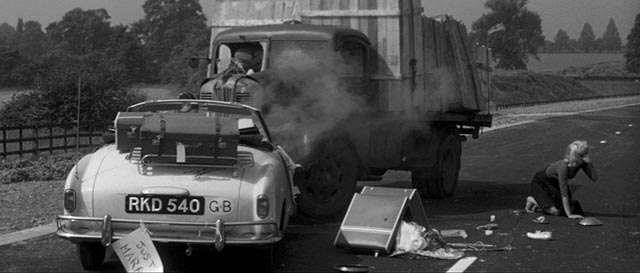
Continuing my recent black-and-white British streak, I’ve just got around to tackling one of Indicator’s three Hammer Films box sets. Each set contains four films, and only two of the twelve features belong to the studio’s Gothic output. Perhaps this is due to licensing issues (the Gothics have been getting Blu-ray releases from Studio Canal and Lionsgate), but the effect is something like a curated collection of the studio’s productions in a range of other genres. I started with volume 2, Criminal Intent, mostly because it contains one of my absolute favourite Hammer films – a very small, intimate character drama which was not treated well by the company when first released, but has gained in reputation and stature over the years until now it’s recognized as one of their best. But before I get to that …
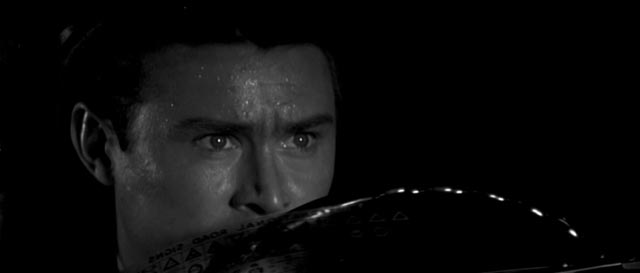
The Full Treatment (Val Guest, 1960)
Surprisingly, the weakest film in the set is the one written and directed by Val Guest, one of my favourite British filmmakers from this period. Based on a novel by Robert Scott Thom, and co-written by Thom with Guest, The Full Treatment (1960, U.S. title Stop Me Before I Kill!) aims for tricky psychological suspense, but suffers from a problematic protagonist whose mood swings are so abrupt and intense that it would take an actor of far greater skill than Ronald Lewis to pull them off while retaining audience sympathy.
What makes the somewhat creaky plot more disappointing is that the film opens with a superb piece of visual storytelling; under the opening titles, the camera gradually surveys the aftermath of a fatal car crash, evoking trauma of almost apocalyptic proportions. Cinematographer Gilbert Taylor displays his mastery of both widescreen framing and precise, complex camera movement as he begins with a closeup of a car radio speaker blasting out Stanley Black’s jazzy theme. The camera pulls back and pauses as we see the driver thrust forward over the steering wheel, his head through the broken windshield. Pulling back further, we see the sports car smashed into the front end of a truck, luggage scattered across the road, an injured woman staggering in a daze. She turns back to the car, pulls the driver away from the wheel – we see a bloody gash on his forehead – then collapses beside him.
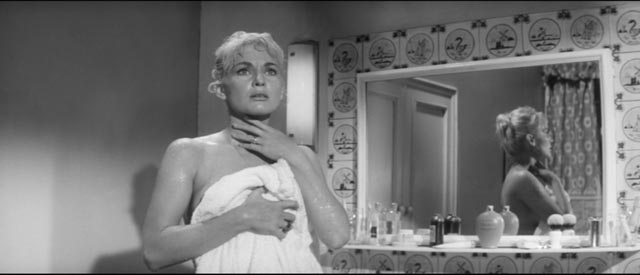
A tanker truck drives up, a man jumping down from the cab before it stops, hurrying to the car. The camera pans with the truck as it stops and tracks along the side of the tank on which a large sign claims that racing star Alan Colby uses Castrol. The truck driver flags down an approaching car, says something to the driver, and the car hurries on as one of the truckers leans into the sports car, abruptly shutting off the music. All we can hear now is the wind and other vehicles approaching; a police car pulls up and an ambulance arrives … the camera rises back and up on a crane as emergency workers begin the job of cleaning up the mess under Val Guest’s director credit.
This opening is Guest at his best, a clean, precise, detailed piece of construction. While the rest of the film isn’t up to this standard, it remains visually strong, with some very effective scenes of dramatic tension … but the script keeps getting in the way.
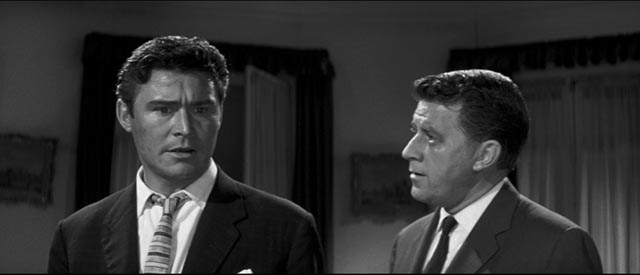
Driver Alan Colby (Lewis) has suffered a severe concussion which has erased his memory of the actual crash and destroyed his confidence – just getting behind the wheel of a car causes debilitating anxiety. A year after the crash, on his release from hospital, he and his wife Denise (Diane Cilento) travel to the South of France for a change of scenery and some rest and relaxation. But the head injury has caused more than physical damage and Alan is given to erupting in jealous rages. He strikes out aggressively at anyone who talks to Denise, suspecting her of infidelity … and then becomes contrite when the rage passes. These emotional swings remain unconvincing and make Alan an unpleasant man – it’s hard to see why Denise is determined to stay with him, particularly after he starts choking her when he loses control.
The critical thing, of course, is for him to remember exactly what happened during the crash – he’s suppressing something crucial which, once known, will explain and defuse his rages. This gives the film a slightly old-fashioned air, despite the jazzy score and the explicit treatment of sex: it seems more like Hitchcock’s Spellbound (1945) and other Hollywood treatments of the modern wonders of psychoanalysis than the existential horrors of Psycho, which came out the same year.
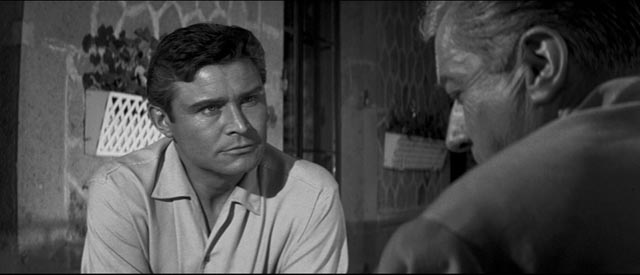
At their hotel overlooking the sea, Alan and Denise meet David Prade (Claude Dauphin), a sociable man who invites them to visit his villa. Alan immediately suspects him of hitting on Denise and becomes really rude. But later, Alan calms down and decides that they should drop in on Prade, who is hosting a dinner for several friends. As everyone eats, Alan becomes suspicious again, hearing double entendres in the most banal dialogue exchanges, and erupts in another rage. Denise stays behind, apologizing, and discovers that Prade is a psychiatrist with a practice in London. She enlists his help (it seems unwisely, given Alan’s increasingly distrustful manner), hoping to convince her husband to talk to the doctor.
This back and forth goes on for a while in a series of repetitive scenes which make Alan less and less sympathetic. The pattern only breaks in the final act when Thom and Guest spring a surprise twist on the audience, exposing Prade himself as a duplicitous figure intent on pushing Alan deeper into his pathology because he desires Denise himself. The melodramatic finale unconvincingly suggests that things may now be okay between Alan and Denise …
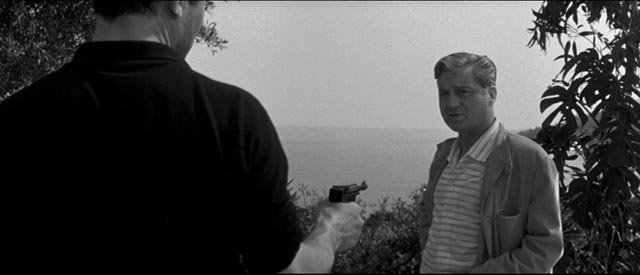
The clumsy and unsatisfying storytelling make this a rare failure from Guest’s strongest period as a director, squeezed into the middle of a run from Yesterday’s Enemy and Expresso Bongo (both 1958), through Hell Is a City (1960), The Day the Earth Caught Fire (1961), Jigsaw (1962) and 80,000 Suspects (1963) to his last really good film, The Beauty Jungle (1964). But despite the dramatic weaknesses, it does have his assured, uncluttered visual style which makes the most of the 2.35:1 frame.
Indicator, it hardly needs saying, present the film in an excellent transfer with a number of useful extras. There are featurettes in which various critics and experts outline the production history, Guest’s work in general, Diane Cilento’s career. The disk also includes the censored U.S. cut, Stop Me Before I Kill!, which features an awkward edit which jumps over a scene in the hotel bathroom with Cilento naked in the tub and Lewis naked in the shower, leading to a bit of nude physical contact which ends in one of his blackouts during which he tries to choke her … In the alternate cut, we only have time to register Cilento in the bath before the scene cuts to the bedroom as they discuss what just happened, dialogue which becomes very cryptic without the intervening action.
*
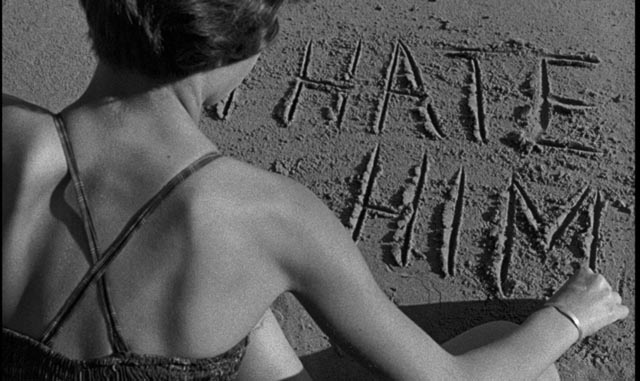
The Snorkel (Guy Green, 1958)
Guy Green, like Val Guest, started out with minor programme pictures in the 1950s, but although he did rise to make a few bigger movies (A Patch of Blue [1965], The Magus [1968], Luther [1974]), he ended up doing a string of made-for-TV movies in the ’80s. At best, he might be described as sturdy and reliable – but he lacked Guest’s visual flair and energy. His most notable work came just before he went “international”, from the World War Two movie Sea of Sand (1958) through The Angry Silence (1960) to The Mark (1961). His sole job for Hammer came just at the start of this short run.
The Snorkel (1958) is built around the familiar plot device of a child knowing more than the adults around her about a seemingly nice character who is actually a monster. She’s inevitably dismissed as imaginatively overactive and the more she throws accusations, the more she’s in danger from the cold-blooded killer. This story goes back at least to Alfred Hitchcock’s Shadow of a Doubt (1943) and Ted Tetzlaff’s The Window (1949, from a Cornell Woolrich story), and turns up in Joseph Ruben’s The Stepfather (1987) and Michael Winner’s Scream for Help (1984) as well as countless TV shows over the years.
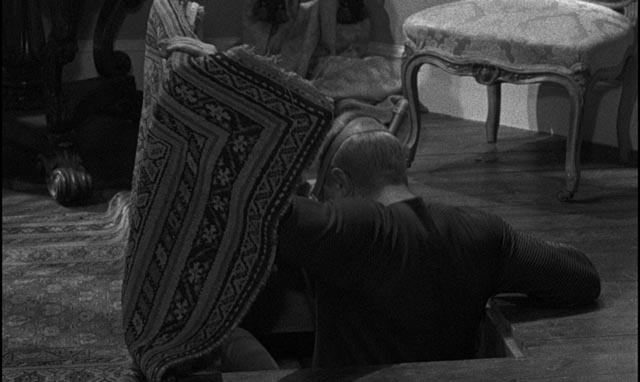
But The Snorkel has some points of genuine interest, beginning with an opening scene in which we watch Paul Decker (Peter van Eyck) methodically committing the “perfect murder” of his wife in an Italian villa. Having drugged her into unconsciousness, he seals up the windows, locks the doors, turns on the gas … and then hides in a crawlspace under the floor breathing through the titular snorkel, which is connected by a hose to the outside. Once the dead woman is found and removed, an apparent suicide, he slips back out of his hole and uses the snorkel again to swim underwater up the coast past the French border to establish a seemingly unbreakable alibi.
When his stepdaughter Candy Brown (Mandy Miller) arrives home from school with her companion Jean Edwards (Betta St. John), she immediately disputes the verdict of suicide despite the seemingly indisputable evidence. Her virulent hatred of Paul is put down to immaturity and resentment that he tried to take her dead father’s place. But actually, it’s based on the fact that she saw Paul kill her father in a “boating accident”, knocking him overboard and holding him under water until he drowned. So Paul, Candy and the audience all know exactly what’s going on, while everyone else reflexively dismisses the overemotional child and offers the grieving husband their sympathy and support.
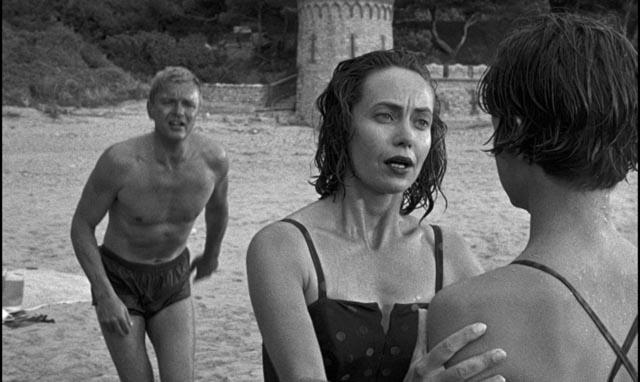
As Jean begins to become more attached to Paul and distant from Candy, we watch him scheming slowly to arrange yet another suicide, setting Candy up as a distraught child driven to repeat her mother’s actions. The film is bookended by these almost identical sequences, generating tension through the seeming impossibility of escape for Candy … but Paul, in his desire to gain all the family’s wealth, has pushed things too far and the plan backfires on him for a satisfactorily ironic ending.
Given the unwavering hostility Candy displays towards Paul, it makes dramatic sense that Paul is exposed at the start as a cold-blooded murderer; otherwise the audience might well lose sympathy for the girl. It also adds a layer to van Eyck’s performance, which on the surface seems both warm and wounded by her constant attacks, justifying Jean’s empathy for the supposedly grieving widower, even as he turns her against her essentially orphaned charge.
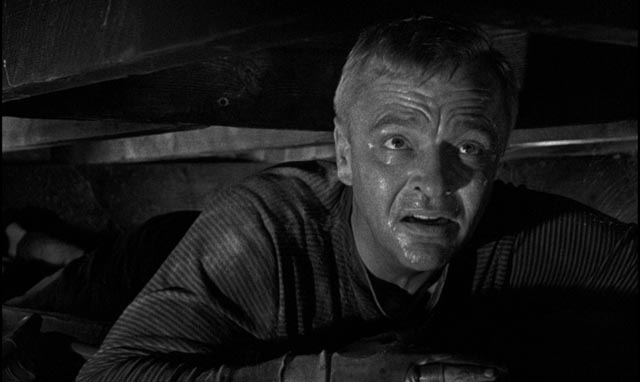
Methodically paced by Green, The Snorkel is a solid if not particularly exciting thriller, nicely shot in crisp black-and-white by Jack Asher, who set the Hammer standard for richly coloured horrors in Curse of Frankenstein (1957) and Dracula (1958). The cast is fine, with van Eyck particularly good as the manipulative sociopath who uses other people’s genuine feelings to his own cold-blooded advantage. Mandy Miller treads a fine line between irritating precociousness and desperate vulnerability in her final theatrical feature, capping a career as a child star which began in 1951 at age seven in Ealing’s The Man in the White Suit and reached its peak the following year in Alexander Mackendrick’s Mandy (1952).
The image on Indicator’s Blu-ray is excellent, with nicely textured grain, and fine detail and contrast. There’s a commentary from Michael Brooks and Johnny Mains. Featurettes include an evaluation of the film by Jonathan Rigby, Josephine Botting and John J. Johnston (all of whom appear on each disk in the set), a brief discussion of Betta St. John’s career, interviews with a couple of crew members, and a discussion of composer Francis Chagrin by music expert David Huckvale. There’s also an alternate ending in which Candy is seen finally to be as cold-blooded as Paul; in the final version of the film, this is softened. Both endings have their virtues, but the one that was actually used plays it a little safer.
*
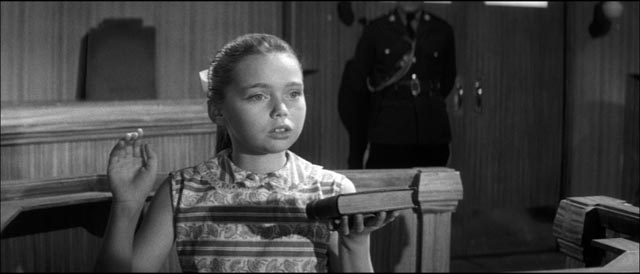
Never Take Sweets from a Stranger (Cyril Frankel, 1960)
Cyril Frankel started out making documentaries in the early ’50s and although he switched to features in 1954 – making both comedies and dramas – he brought his documentary roots with him, injecting social concerns into works as varied as Man of Africa (1956, a dramatization of attempts to develop farming in Uganda), No Time for Tears (1957, an account of doctors and nurses working in a children’s hospital) and She Didn’t Say No! (1958, a comedy about an Irish woman living in a small town who has six illegitimate children by six different fathers). So it’s not surprising that his first feature for Hammer is an atypical-for-the-studio social issues drama with thriller elements. (He later made the more conventional supernatural horror film The Witches [1966] for the studio.)
Never Take Sweets from a Stranger (1960, U.S. title Never Take Candy from a Stranger) is a surprising project for Hammer, dealing with the very touchy subject of paedophilia. John Hunter’s script (adapted from a play by American writer Roger Garis) treats the subject seriously, while nonetheless wrapping it in melodramatic thrills. On its release, the film didn’t get good notices and made little money, partly because of the inherently problematic theme, partly because it didn’t fit easily into any marketable category – it may have fared better if released by a different studio as Hammer was firmly identified by 1960 with disreputable bloody horrors. Audiences and critics weren’t ready for a social issues drama like this, particularly from this company.
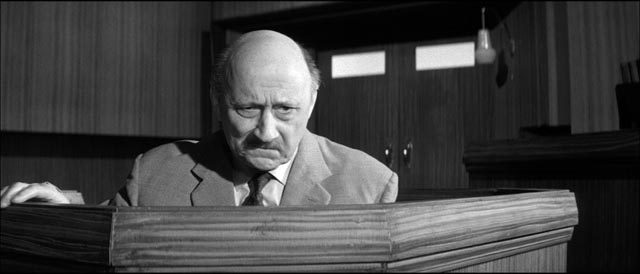
The play was originally set in an American town, but the film relocates the action to Eastern Canada. It’s an awkward choice, probably made to distance the material slightly from England (commercially risky to suggest that child sexual abuse might be happening at home) while still allowing for a mostly British cast. There’s an oddly inauthentic note to the setting which probably wouldn’t have been apparent to an English audience, but which undermines the story slightly for anyone familiar with the region where it’s supposedly set. (I’m reminded of the bizarre “Manitoba” of Arthur Crabtree’s Fiend Without a Face [1957].)
Teacher Peter Carter (Patrick Allen) has returned to Canada with his English wife Sally (Gwen Watford) to take up a post as principal of the local high school in a small town in either Nova Scotia or New Brunswick (the film’s sense of geography is vague). The whole town is dominated by the Olderberry family, owners of the lumber mill which employs most of the population. Things seem very positive at first … but then their daughter Jean (Janina Faye) casually mentions one evening that she and her friend Lucille (Frances Green) had been to visit the Olderberry patriarch Clarence Sr. (Felix Aylmer), who gave them candy and watched them dance naked for him. Jean is blithely unconcerned, but her parents and grandmother (Alison Leggatt) hear loud alarms. Sally wants to rush off to the police immediately, but Peter is more cautious – they’ve only just settled here and he has a very public and responsible position.
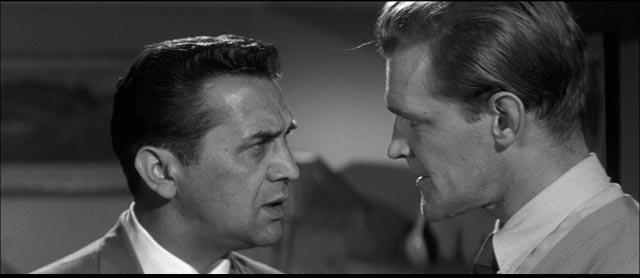
But despite this initial conflict, the Carters do go to the police, who immediately try to downplay what happened. Bringing such a charge against the town’s first family could cause the Carters serious problems. They get a taste of this very quickly as the locals begin to close ranks and Clarence Olderberry Jr. (Bill Nagy) tries to apply pressure as head of the school committee which hired Peter. Nonetheless, they press charges and a trial is scheduled. Lucille’s parents send her away, leaving only Jean as a prosecution witness. But even as Clarence Sr.’s defence counsel (Niall MacGinnis) sets out to destroy the girl on the stand, her parents learn that it’s an open secret in town that the old man is unsafe around children. Economic dependence simply makes them take personal precautions while doing nothing about the danger he poses.
The lengthy trial sequence at the centre of the film is pretty harsh stuff. While Jean had not suffered any obvious harm from the old man’s voyeuristic “game”, serious psychological damage is inflicted during the cross examination which undermines her account and results in a dismissal of the charges. Peter sees no option but to resign and leave the community, despite Clarence Jr.’s smug offer to forget the whole thing and show his supposed magnanimity by keeping Peter on.
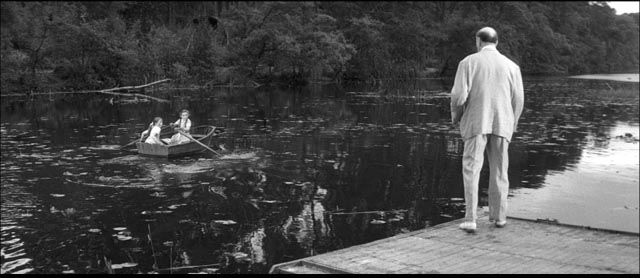
As plans for departure are made, Jean goes to say goodbye to her friend Lucille, only to find herself and the other girl pursued through the woods by Clarence Sr., seemingly empowered by his exoneration. He corners the girls in an abandoned cabin by the lake and by the time a search party scouring the woods for the girls reaches the place, it’s too late. The town’s queasy deference to the wealth and power of the Olderberry family has led inevitably to tragedy. While the ending is heightened melodrama, the film’s treatment of a community’s inability to deal with something it’s afraid to address openly is dramatically powerful. While it’s not surprising that Hammer didn’t go down this particular path again, they did an admirable job here with a difficult subject.
The film was nicely shot by the great Freddie Francis and the image on the disk is excellent, with a lot of detail and strong contrast. There are two versions of the film, with minor differences; the British and U.S. title sequences are slightly different in addition to the replacement of the original “Sweets” with “Candy”, and a few instances of British swearing are overdubbed with milder words. Once again, there’s a featurette with experts evaluating the film’s anomalous position in the studio’s output. There’s a brief interview with Janina Faye, an appreciation of actress Gwen Watford, an appreciative interview about the film with Matthew Holness (Garth Marenghi himself), a Trailers From Hell commentary by Brian Trenchard-Smith, and a substantial discussion of composer Elizabeth Lutyens’ music by David Huckvale.
*
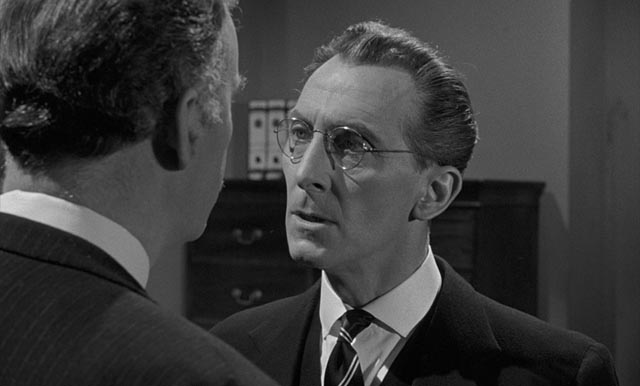
in Quentin Lawrences’s Cash on Demand (1961)
Cash on Demand (Quentin Lawrence, 1961)
And so, finally, we get to the gem of the set. Cash On Demand doesn’t have big themes or big dramatic moments, but in its own small way, it’s a perfect film, written, directed and performed with consummate skill. Hammer apparently didn’t realize what they had in this character study disguised as a heist movie and held up distribution for a couple of years, at which time they hacked thirteen minutes out of it, doing serious harm to the film.
Quentin Lawrence had a busy career in television for a quarter century, directing dozens of episodes for numerous series (IMDb lists almost two-hundred credits), but only made six theatrical features (most if not all based on previous television productions). Although The Trollenberg Terror (aka The Crawling Eye, 1958) is cheesily entertaining, there’s nothing particularly distinctive about these movies … except for Cash On Demand. It’s as if Lawrence sensed he had something special and rose to the occasion here. He wisely made no attempt to “open up” the chamber drama, keeping the action to the three interior sets of a small provincial bank, with just a couple of shots in the snowy street outside the front door.
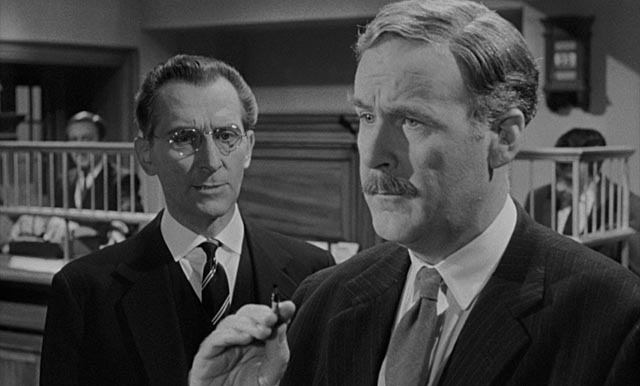
The cast is also small, but finely balanced. In the opening scenes, we’re introduced quickly and economically to the bank staff, five people who have distinct personalities and who convince us that they’ve been working together for years. They show the kind of easy familiarity which grows with such forced proximity, cemented by their shared antipathy for the bank’s manager, Harry Fordyce (Peter Cushing), a prissy, pedantic little despot who engenders dislike because he thinks respect can only be gained by lording it over his underlings. But today, as snow begins to fall outside and the staff are planning a little after work get-together to celebrate Christmas, routine is disrupted by the arrival of a brash, extroverted man claiming to be from the bank’s insurance underwriters, come to evaluate security. His air of self-assurance gains him the kind of respect and deference Fordyce longs for. When head clerk Pearson (Richard Vernon) announces the arrival of Colonel Gore Hepburn, Fordyce asks what kind of man he is; Pearson says “Oh, I should say a man of some consequence.” Stature and respect are embedded in one’s class and Fordyce’s petty bourgeois status just doesn’t cut it with the employees.
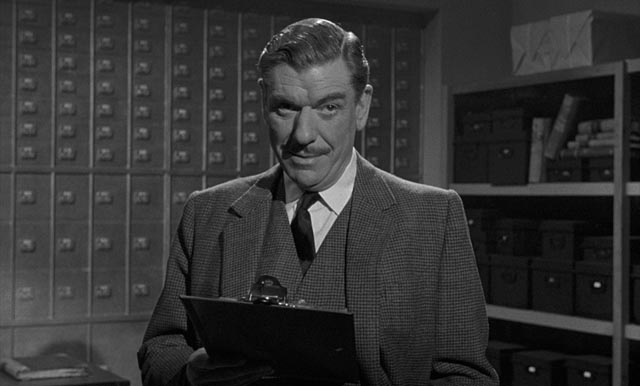
Once the Colonel is alone with Fordyce, he reveals himself to be a bank robber, using a phone call from Fordyce’s wife to let the manager know that she and his son are being held by men who will kill them if he doesn’t cooperate. Fordyce’s smug self-assurance crumbles immediately and the Colonel takes his time to work his scam, using other members of the staff to aid without them suspecting that they’re doing anything out of the ordinary. As played by André Morell, the Colonel obviously relishes the ease with which he manipulates others’ expectations (and the reflexive deference shown to a man of his apparent class) to help him get what he wants; but even more, he enjoys inflicting emotional and psychological stress on Fordyce, a man whose own pettiness causes pain to those under him.
Cash On Demand is such a simple film that it’s difficult to convey how rich it is. The plan unfolds with only a few minor hitches, but Lawrence keeps it all so tightly focused that the suspense steadily builds and, more importantly, we see Fordyce – because of the particular circumstances – struggling to help the robber succeed, something which is an absolute violation of his own cramped morality. This reaches a crescendo when the police, who have been alerted finally by Pearson, arrive with the Colonel in handcuffs. Fordyce, believing that his family is still in danger, works desperately to convince the police that the Colonel is not a robber, that he works for the insurance company, that it’s all a mistake … digging himself steadily into a deeper hole in which he looks more and more like the Colonel’s willing accomplice in the robbery.
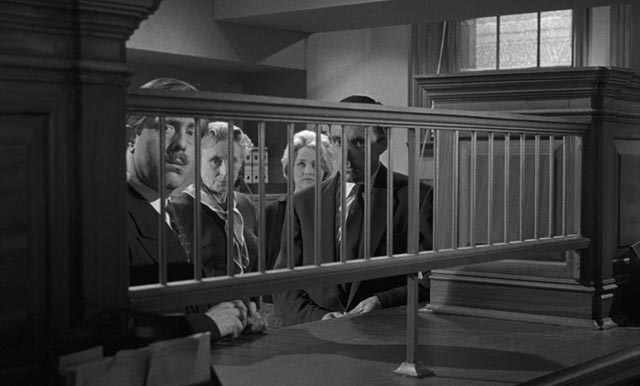
Cash On Demand, directed with unobtrusive flair by Lawrence, gains its impact from the richness of the performances. Morrell (just two years after playing the best Quatermass in Nigel Kneale’s third BBC serial) and Cushing (playing very much against his firmly established Hammer type) were never better than here, creating fully rounded characters who reveal psychological and emotional nuances with every line and gesture. Beyond the building tension of the situation, the film’s greatest pleasure is watching these two performers work on each other, with Cushing willingly allowing Morrell to wear him down and fray his tightly controlled persona until, by the end, Fordyce has gained a degree of self-knowledge and humility.
I’ve seen disdainful comments on-line about this being merely an “obvious” retelling of A Christmas Carol, with Fordyce as Scrooge and the Colonel as all the ghosts rolled into one, but that’s a gross oversimplification. There is definitely a structural echo of Dickens’ perennial classic, but the details of character and action in the film, the specificity of the situation, give it a life of its own. It is, as I’ve suggested above, a perfectly cut and polished gem.
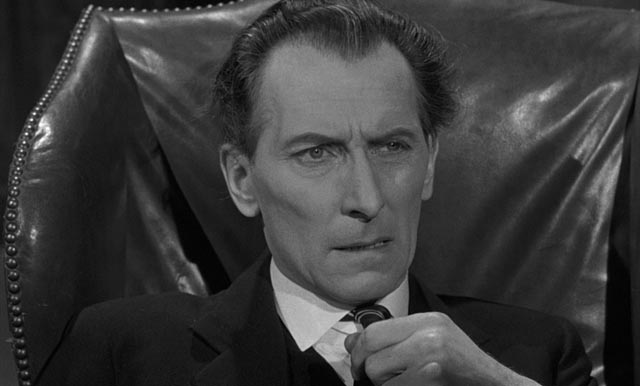
Once again, Indicator’s disk presents a beautiful image highlighting the cinematography of Arthur Grant, the other great Hammer cameraman. The disk contains both cuts of the film – the eighty-minute full version which was released in the U.S. and the sixty-seven-minute British theatrical release. The latter was created by cutting out almost all of the business involving the bank’s staff, which was apparently viewed as mere padding, although in fact every detail goes towards illuminating Fordyce’s character and the ways in which he changes. Chopping these scenes out does irreparable harm to the story.
Jonathan Rigby and David Miller provide a commentary on the longer cut, and the main featurette has the usual suspects discussing the film and its position in Hammer’s output. There’s also a brief tribute to actress Lois Daine who plays the youngest member of the staff.
*
This set confirms Indicator’s status as one of the finest companies currently producing disks, not just in England but on either side of the Atlantic. With terrific transfers, substantial supplements and a thick booklet for each film with new essays, archival reviews and promotional material to give further context, this is a Criterion-worthy release. In every way, it’s a big step up from Sony’s 2010 3-disk Icons of Suspense DVD set, which included all four films in their U.S. versions. I’m looking forward to tackling the other two sets in the series – and hope there are more to come.
Comments
I’ve only seen The Snorkel and liked it well enough. Creepy guy but I like the supernatural films a bit better.
I have a couple of sets of old Hammer crime films to watch but who knows when I’ll get to those. I’ve been playing catch up on Hammer films, I’ve seen some but never had the DVDs. I picked up the two Mill Creek DVD sets, one of which has The Snorkel, I did watch those sets. I have another 8 movie set to watch and I recently got a 21 film collection from Amazon UK. Each film is on it’s own disc and there are commentaries and other extras. I haven’t started that yet.
Right now I’m watching a Columbia and Amicus production, Torture Garden. I’d seen it in 2011 but didn’t have a copy. I got the Psycho Circus Triple Feature Blu-ray from Mill Creek. It’s got The Brotherhood Of Satan and The Creeping Flesh on one Blu-ray. Looks fine. I enjoy the British horror of the time and I don;t mind an anthology film.
I watched Indicator’s Blu-ray of Torture Garden last week. I always enjoy the Amicus anthology movies, though they’re not scary and the stories don’t have time to develop any depth – they are fun, though, like campfire tales or old-time radio shows.
Haven’t seen Brotherhood of Satan or The Creeping Flesh in years – I should dig them out for another look.